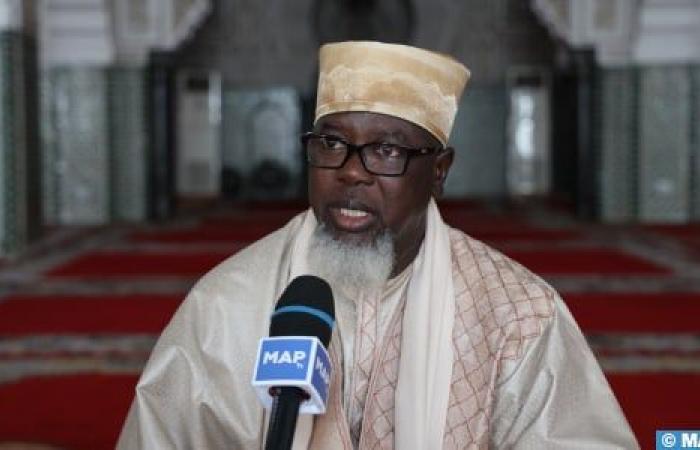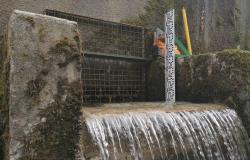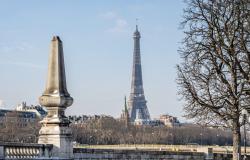Thursday, November 21, 2024 at 12:42
Dakar – Inaugurated in 1964 by the late HM King Hassan II and the President of Senegal, Léopold Sédar Senghor, the Great Mosque of Dakar embodies a living memory of Morocco in Senegal, said the deputy Imam Ratib of this religious building, Abdoulaye Diene .
“Sixty years after its construction, this high place of worship is still standing, full of symbols and memories,” declared Mr. Diene in an interview with MAP on the occasion of the celebration of the 60th anniversary of the construction of this religious building, the most important in the Senegalese capital.
Richly decorated, both inside and outside, the Great Mosque of Dakar is the living symbol of the centuries-old and deep relations that exist between Senegal and Morocco, two brotherly and friendly countries, rejoiced the deputy imam, Abdoulaye Diene.
Abdoulaye Diene did not fail to praise the architectural style of this mosque, its imposing minaret symbolizing the oneness of Almighty God, its water jets, its arcades and its decorations which, he said, “inevitably bring you back in the Sherifian Kingdom where beautiful mosques are an integral part of the city’s decor.”
He also recalled that the Great Mosque of Dakar has signed structuring conventions and agreements which are capable of raising it to the international standard of modern mosques, noting that it is also a symbol of peace, tolerance and good neighborliness.
“It was a strong signal and a call for tolerance and peaceful cohabitation,” he said, stressing that the Great Mosque of Dakar plays a leading role in strengthening relations between Morocco and Senegal in the framework of regular exchanges, each as beneficial as the other.
Deputy Imam Ratib also highlighted the logistical, material and technical support that the mosque benefits from the Kingdom of Morocco, notably through the Mohammed VI Foundation of African Ulema, chaired by HM King Mohammed VI, Amir Al- Mouminine, considering that the effective involvement of the Foundation in the training of young people, imams and African ulemas makes it possible, through the various programs, to promote the knowledge and precepts of Islam and to raise the scientific and cultural of the beneficiaries.
Likewise, its training programs make it possible to reach the maximum number of actors and guide them towards a well-balanced religion practiced in peace and acceptance of others, continued the Deputy Imam, adding that they also aim to interconnect actors of the Muslim religion wherever they are in Africa and to disseminate messages of peace and good neighborliness despite the diversity of languages and other local cultures.
In the same vein, Abdoulaye Diene underlined the avant-garde role that Morocco plays in the fight against hate speech, citing in this regard the decision of the United Nations General Assembly which adopted in 2023 in unanimously of its 193 members, a Resolution presented by Morocco against the burning of the Holy Quran and hate speech, and which is the continuum of the subsequent resolution having proclaimed, in 2021, the June 18 each year as “International Day Against Hate Speech”.
Diene at the same time reviewed the reforms undertaken in the religious field in Morocco, notably the training of Imams as well as morchidins and morchidates.
On the occasion of the celebration of the 60th anniversary of the construction of the Great Mosque of Dakar in Senegal, the Mohammed VI Foundation of African Oulema celebrates this great event whose aim is the strengthening of spiritual and historical relations between the Kingdom of Morocco and the Republic of Senegal.
The importance of this great event lies not only in the preservation of the common memory of the two countries, but it also constitutes an excellent opportunity to pay tribute to all the living forces who contributed to the building of this historical heritage, underlines the Foundation.
An official ceremony will commemorate this sixtieth anniversary within the Great Mosque of Dakar, on Friday November 22, 2024.
An exhibition under the theme “Historical memory of Moroccan-Senegalese spiritual relations” will be organized at the same time, where written and visual documents will be exhibited, retracing the historical and architectural dimensions of this religious building.
This commemoration also includes the organization of an international conference under the theme; “The values of peace and living together in the African context”, with the participation of a college of scholars and experts from the Kingdom of Morocco, the Republic of Senegal and other African countries, on 23 and 24 november.






